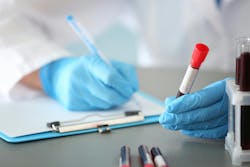Scientists develop a simple blood test to quickly diagnose sarcoidosis
A research project supported by the National Institutes of Health has developed a tool to rapidly and inexpensively diagnose sarcoidosis, a chronic inflammatory disease marked by the growth of tiny lumps called granulomas in the lungs and other organs in the body.
The tool, which uses a simple blood test, could allow for selective use of more invasive diagnostic tests often used to identify the disease. The findings published in the American Journal of Respiratory and Critical Care Medicine.
To identify antigens and determine which might be linked to sarcoidosis, scientists collected lung fluid samples and blood cells from patients with pulmonary sarcoidosis, then extracted the genetic material. Using a combination of molecular techniques, the researchers homed in on two newly described disease-specific antigen biomarkers that only bind to the antibodies of sarcoidosis positive patients.
They next designed a highly specific blood test, which only requires a small amount of blood, to determine if they could accurately detect sarcoidosis. To verify the test, researchers compared blood samples from 386 people, which included patients with sarcoidosis, patients with tuberculosis, patients with lung cancer, and healthy individuals. The researchers confirmed that their test was able to differentiate patients who had sarcoidosis from those with other respiratory diseases.

